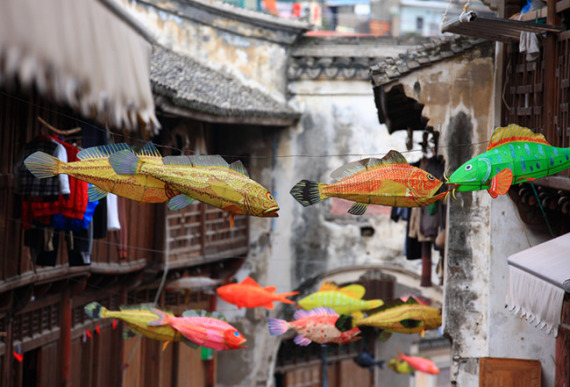10 sensuous delights of a visit to Ningbo
 0 Comment(s)
0 Comment(s) Print
Print E-mail Shanghai Daily, May 25, 2015
E-mail Shanghai Daily, May 25, 2015
7. Dongqian Lake
One of China's most beautiful and serene lakes, Dongqian Lake in Ningbo is four times as large as the West Lake in neighboring Hangzhou but blessedly less famous — and less crowded with tourists.
Dongqian Lake "combines the verve of Taihu Lake and the charm of West Lake," a perfect hybrid of masculinity and femininity, according to Guo Moruo (1892-1978), a renowned scholar and poet of contemporary China.
We took a long causeway that divides the lake, which is rimmed by willows and greenery — not spoiled by hotels and development. Around the lake are lush meadows, with rugged hills in the distance.
It seems like an emerald.
We crossed several stone arches before parking in the center of the causeway, which divides the lake and offers a spectacular view.
Beyond a thick curtain of willow, we spotted ospreys or fish hawks gliding over the glistening water and diving for fish — they are tethered on a fishing line — then returning to a fishing boat where a fisherman takes their catch. Nearby in the center of the lake is Xiayu (Rosy Clouds and Islands) Temple, where Guanyin, the Goddess of Mercy, is venerated. A huge stone statue of the deity rises from the water, seated on her lotus throne and wearing a benign smile.
The temple on the other side of the island consists of newly renovated Buddhist halls. The main attraction, however, is a towering stone boat and a deep underground cave.
The boat is built on a three-story-high altar, reached by a marble staircase on which dragons are embossed. The boat is itself three stories high and carries a single passenger on the deck, a monk staring ahead, his hands folded in namaste. The inscription on the sale reads: "Ci Hang Pu Du" ("A Mercy Ferry for All the Living to Land of the Pure").
The cave itself is not remarkable, but the legend is touching. It is said that a filial son once escorted his blind mother, who was a pious Buddhist, to this cave for a pilgrimage to Goddess Guanyin — instead of going to Putuo Mountain — to keep his mother from a risky sea voyage.
Guanyin noted his devotion and appeared before the man and his mother to reward their piety. Thus the cave is called Putuo Dong Tian (Guanyin's Sanctum). There are tens of thousands of Buddhist temples around China, but it's rare to find one like Xiayu with its main entrance facing open water. Adding to the charm, dragon boats occasionally ply the waters.
We were lucky to see a dragon boat race with cheering rowers.
The scenery of Dongqian Lake is legendary, recorded 2,000 years ago.
It is said that Xi Shi, one of the famous Four Beauties of ancient China, was taken there by her husband Fan Li, the most renowned plutocrat of that age, for a romantic retreat after his long service in the Yue Kingdom of the Spring and Autumn Period (770-476 BC).
8. Shipu Old Town
Shipu Old Town is a classic example of an ancient fishing village. Noted contemporary scholar Yu Qiuyu celebrated the site as a worthy snapshot of traditional Chinese maritime life. Much of its architecture, dating back to the Ming Dynasty (1368-1644), has been preserved.
The architecture is indeed captivating. The buildings of Shipu Old Town feature the extended eaves and heavy wooden doors of the past. Even the homes of local residents bear the imprint of the past after careful renovation.
Life here hasn't changed much over the centuries. Drying fish still hang on outdoor racks, flowers are planted in old conch shells and tempting seafood aromas waft from local kitchens. This is a community gloriously tied to the sea.
For visitors, the town provides a glimpse of the culture and customs that gave coastal life its uniqueness.
In 1933, the town was the backdrop of the classic Chinese movie "Song of the Fishermen." The film, by Cai Chusheng, characterized Chinese cinema of the 1930s. The movie, when released, ran for a record 84 days.
Be sure to visit the town museum, which provides an insight into the hard, often risky life of seafaring fishermen. Exhibits show the small boats they used and the somewhat dilapidated houses where they lived. There's also a specimen of a whale that was hunted there in 2004.
Famous stunt jumper Ko Shou-liang, known as "Asia's Flying Man," was a native of Shipu. In the 1950s, Ko and his father moved to Taiwan. Ko is famous for successfully jumping across the Yellow River in a sports car and over the Great Wall on a motorcycle. There is a special museum in the town celebrating his feats. Ko died of asthma in 2003.
Throughout the year Shipu hosts a variety of events related to marine culture and fishing. Visitors can camp on the beaches, go deep-sea fishing with the locals, participate in water sports and, of course, dine on exquisite seafood cuisine.
You can even catch your own fish and take them to most restaurants, which are happy to cook to order. Some restaurants will gladly buy any surplus catch, or you can take fish home in an ice chest.







